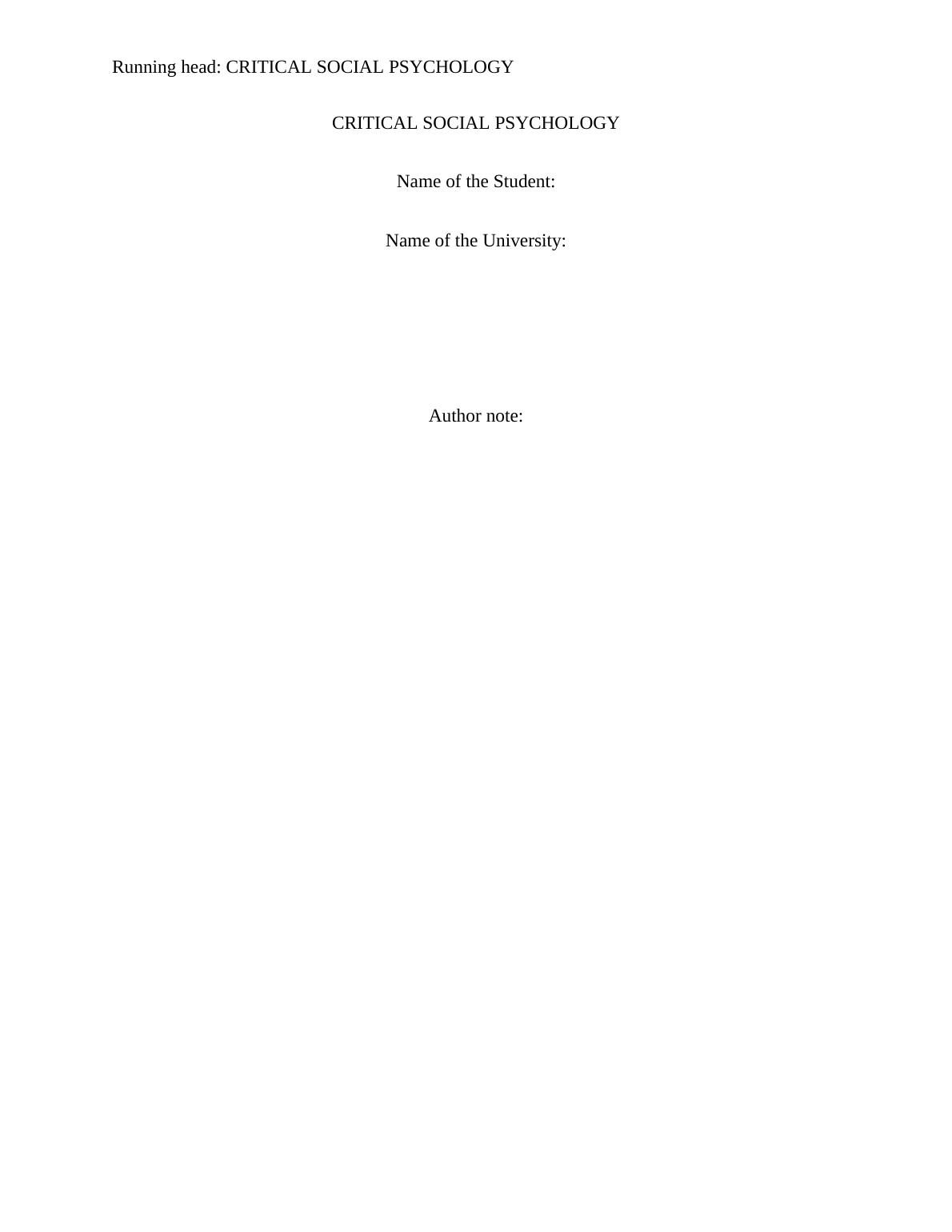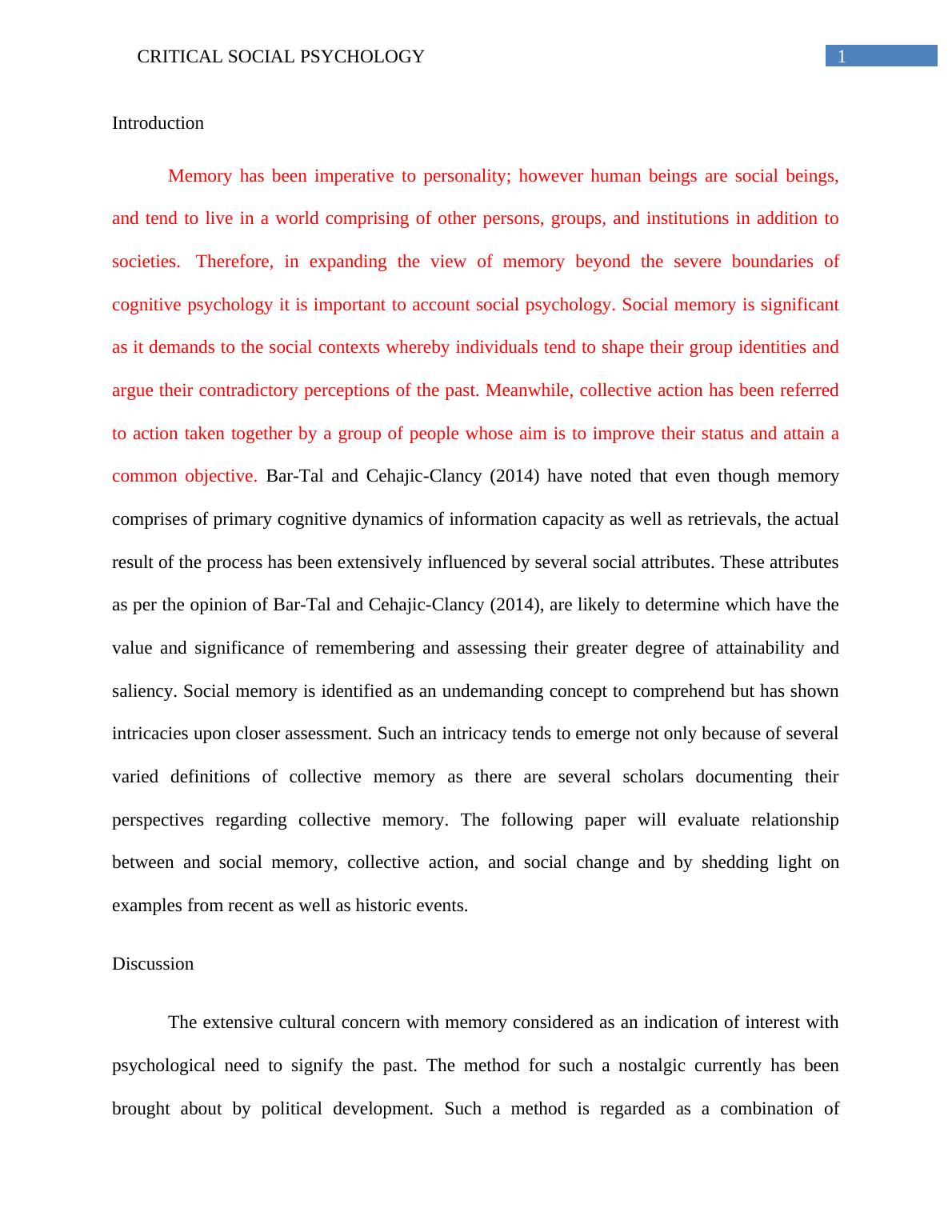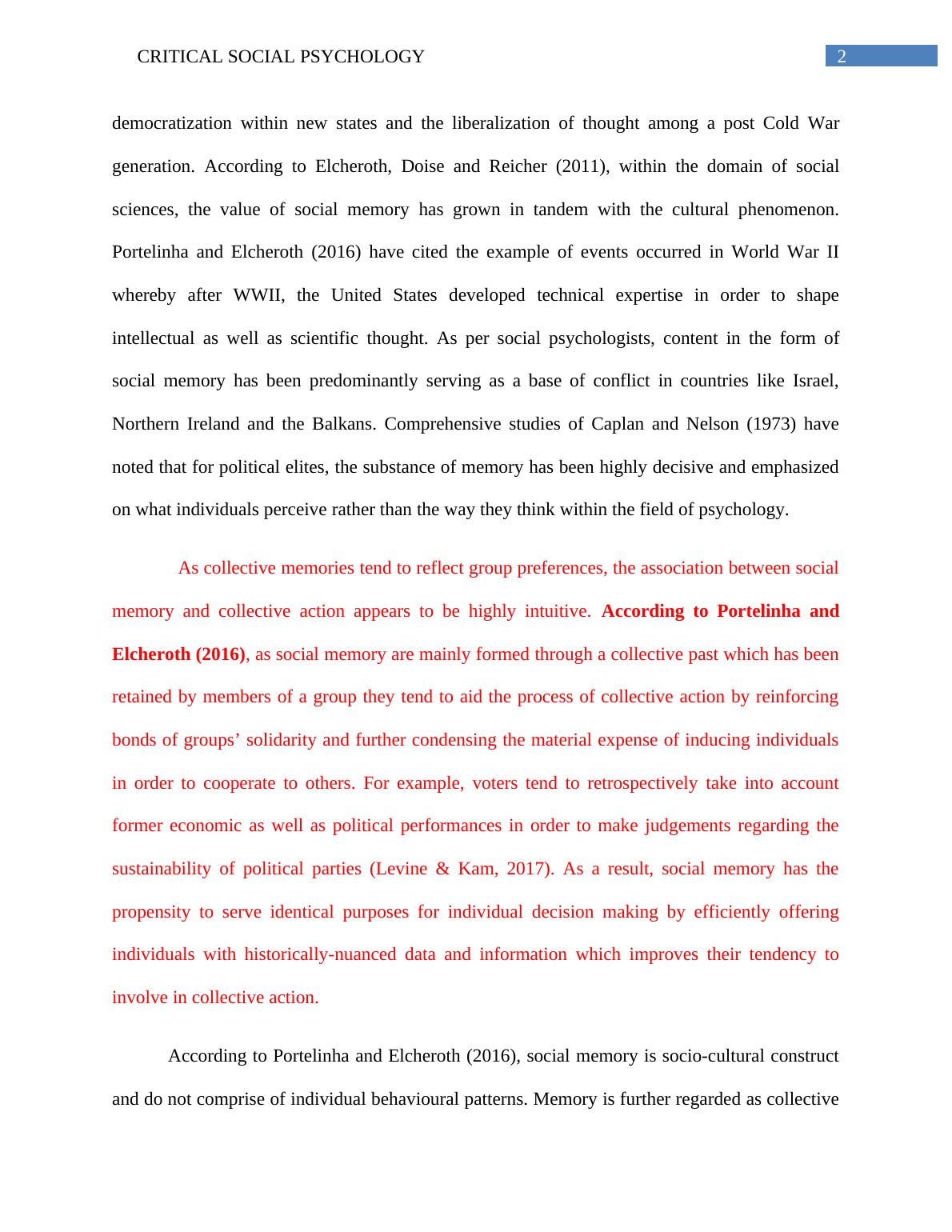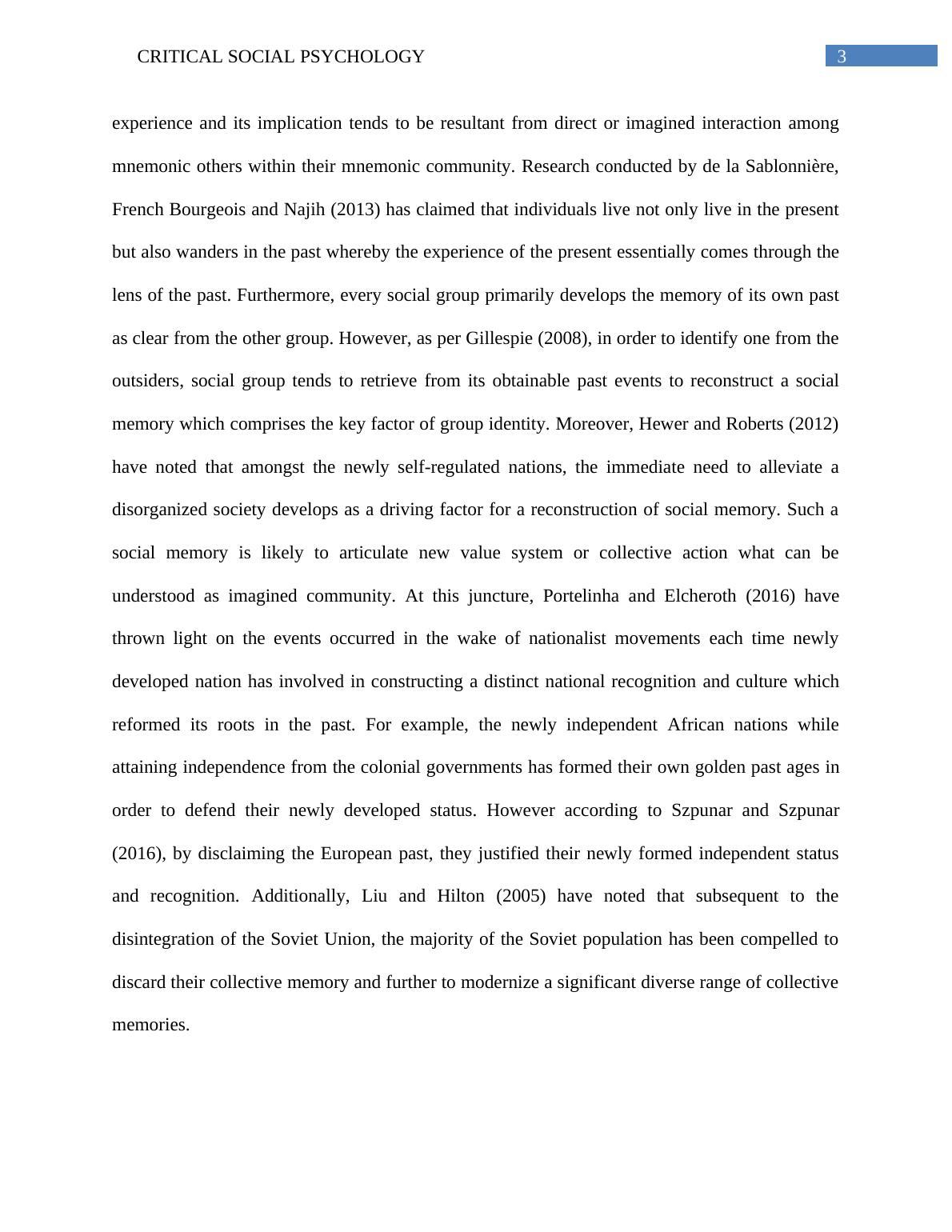Critical Social Psychology
11 Pages3024 Words61 Views
Added on 2023-01-09
About This Document
This paper examines the relationship between social memory, collective action, and social change. It explores how social memory shapes group identities and influences collective action. Examples from recent and historic events are used to illustrate these concepts.
Critical Social Psychology
Added on 2023-01-09
ShareRelated Documents
Running head: CRITICAL SOCIAL PSYCHOLOGY
CRITICAL SOCIAL PSYCHOLOGY
Name of the Student:
Name of the University:
Author note:
CRITICAL SOCIAL PSYCHOLOGY
Name of the Student:
Name of the University:
Author note:

1CRITICAL SOCIAL PSYCHOLOGY
Introduction
Memory has been imperative to personality; however human beings are social beings,
and tend to live in a world comprising of other persons, groups, and institutions in addition to
societies. Therefore, in expanding the view of memory beyond the severe boundaries of
cognitive psychology it is important to account social psychology. Social memory is significant
as it demands to the social contexts whereby individuals tend to shape their group identities and
argue their contradictory perceptions of the past. Meanwhile, collective action has been referred
to action taken together by a group of people whose aim is to improve their status and attain a
common objective. Bar-Tal and Cehajic-Clancy (2014) have noted that even though memory
comprises of primary cognitive dynamics of information capacity as well as retrievals, the actual
result of the process has been extensively influenced by several social attributes. These attributes
as per the opinion of Bar-Tal and Cehajic-Clancy (2014), are likely to determine which have the
value and significance of remembering and assessing their greater degree of attainability and
saliency. Social memory is identified as an undemanding concept to comprehend but has shown
intricacies upon closer assessment. Such an intricacy tends to emerge not only because of several
varied definitions of collective memory as there are several scholars documenting their
perspectives regarding collective memory. The following paper will evaluate relationship
between and social memory, collective action, and social change and by shedding light on
examples from recent as well as historic events.
Discussion
The extensive cultural concern with memory considered as an indication of interest with
psychological need to signify the past. The method for such a nostalgic currently has been
brought about by political development. Such a method is regarded as a combination of
Introduction
Memory has been imperative to personality; however human beings are social beings,
and tend to live in a world comprising of other persons, groups, and institutions in addition to
societies. Therefore, in expanding the view of memory beyond the severe boundaries of
cognitive psychology it is important to account social psychology. Social memory is significant
as it demands to the social contexts whereby individuals tend to shape their group identities and
argue their contradictory perceptions of the past. Meanwhile, collective action has been referred
to action taken together by a group of people whose aim is to improve their status and attain a
common objective. Bar-Tal and Cehajic-Clancy (2014) have noted that even though memory
comprises of primary cognitive dynamics of information capacity as well as retrievals, the actual
result of the process has been extensively influenced by several social attributes. These attributes
as per the opinion of Bar-Tal and Cehajic-Clancy (2014), are likely to determine which have the
value and significance of remembering and assessing their greater degree of attainability and
saliency. Social memory is identified as an undemanding concept to comprehend but has shown
intricacies upon closer assessment. Such an intricacy tends to emerge not only because of several
varied definitions of collective memory as there are several scholars documenting their
perspectives regarding collective memory. The following paper will evaluate relationship
between and social memory, collective action, and social change and by shedding light on
examples from recent as well as historic events.
Discussion
The extensive cultural concern with memory considered as an indication of interest with
psychological need to signify the past. The method for such a nostalgic currently has been
brought about by political development. Such a method is regarded as a combination of

2CRITICAL SOCIAL PSYCHOLOGY
democratization within new states and the liberalization of thought among a post Cold War
generation. According to Elcheroth, Doise and Reicher (2011), within the domain of social
sciences, the value of social memory has grown in tandem with the cultural phenomenon.
Portelinha and Elcheroth (2016) have cited the example of events occurred in World War II
whereby after WWII, the United States developed technical expertise in order to shape
intellectual as well as scientific thought. As per social psychologists, content in the form of
social memory has been predominantly serving as a base of conflict in countries like Israel,
Northern Ireland and the Balkans. Comprehensive studies of Caplan and Nelson (1973) have
noted that for political elites, the substance of memory has been highly decisive and emphasized
on what individuals perceive rather than the way they think within the field of psychology.
As collective memories tend to reflect group preferences, the association between social
memory and collective action appears to be highly intuitive. According to Portelinha and
Elcheroth (2016), as social memory are mainly formed through a collective past which has been
retained by members of a group they tend to aid the process of collective action by reinforcing
bonds of groups’ solidarity and further condensing the material expense of inducing individuals
in order to cooperate to others. For example, voters tend to retrospectively take into account
former economic as well as political performances in order to make judgements regarding the
sustainability of political parties (Levine & Kam, 2017). As a result, social memory has the
propensity to serve identical purposes for individual decision making by efficiently offering
individuals with historically-nuanced data and information which improves their tendency to
involve in collective action.
According to Portelinha and Elcheroth (2016), social memory is socio-cultural construct
and do not comprise of individual behavioural patterns. Memory is further regarded as collective
democratization within new states and the liberalization of thought among a post Cold War
generation. According to Elcheroth, Doise and Reicher (2011), within the domain of social
sciences, the value of social memory has grown in tandem with the cultural phenomenon.
Portelinha and Elcheroth (2016) have cited the example of events occurred in World War II
whereby after WWII, the United States developed technical expertise in order to shape
intellectual as well as scientific thought. As per social psychologists, content in the form of
social memory has been predominantly serving as a base of conflict in countries like Israel,
Northern Ireland and the Balkans. Comprehensive studies of Caplan and Nelson (1973) have
noted that for political elites, the substance of memory has been highly decisive and emphasized
on what individuals perceive rather than the way they think within the field of psychology.
As collective memories tend to reflect group preferences, the association between social
memory and collective action appears to be highly intuitive. According to Portelinha and
Elcheroth (2016), as social memory are mainly formed through a collective past which has been
retained by members of a group they tend to aid the process of collective action by reinforcing
bonds of groups’ solidarity and further condensing the material expense of inducing individuals
in order to cooperate to others. For example, voters tend to retrospectively take into account
former economic as well as political performances in order to make judgements regarding the
sustainability of political parties (Levine & Kam, 2017). As a result, social memory has the
propensity to serve identical purposes for individual decision making by efficiently offering
individuals with historically-nuanced data and information which improves their tendency to
involve in collective action.
According to Portelinha and Elcheroth (2016), social memory is socio-cultural construct
and do not comprise of individual behavioural patterns. Memory is further regarded as collective

3CRITICAL SOCIAL PSYCHOLOGY
experience and its implication tends to be resultant from direct or imagined interaction among
mnemonic others within their mnemonic community. Research conducted by de la Sablonnière,
French Bourgeois and Najih (2013) has claimed that individuals live not only live in the present
but also wanders in the past whereby the experience of the present essentially comes through the
lens of the past. Furthermore, every social group primarily develops the memory of its own past
as clear from the other group. However, as per Gillespie (2008), in order to identify one from the
outsiders, social group tends to retrieve from its obtainable past events to reconstruct a social
memory which comprises the key factor of group identity. Moreover, Hewer and Roberts (2012)
have noted that amongst the newly self-regulated nations, the immediate need to alleviate a
disorganized society develops as a driving factor for a reconstruction of social memory. Such a
social memory is likely to articulate new value system or collective action what can be
understood as imagined community. At this juncture, Portelinha and Elcheroth (2016) have
thrown light on the events occurred in the wake of nationalist movements each time newly
developed nation has involved in constructing a distinct national recognition and culture which
reformed its roots in the past. For example, the newly independent African nations while
attaining independence from the colonial governments has formed their own golden past ages in
order to defend their newly developed status. However according to Szpunar and Szpunar
(2016), by disclaiming the European past, they justified their newly formed independent status
and recognition. Additionally, Liu and Hilton (2005) have noted that subsequent to the
disintegration of the Soviet Union, the majority of the Soviet population has been compelled to
discard their collective memory and further to modernize a significant diverse range of collective
memories.
experience and its implication tends to be resultant from direct or imagined interaction among
mnemonic others within their mnemonic community. Research conducted by de la Sablonnière,
French Bourgeois and Najih (2013) has claimed that individuals live not only live in the present
but also wanders in the past whereby the experience of the present essentially comes through the
lens of the past. Furthermore, every social group primarily develops the memory of its own past
as clear from the other group. However, as per Gillespie (2008), in order to identify one from the
outsiders, social group tends to retrieve from its obtainable past events to reconstruct a social
memory which comprises the key factor of group identity. Moreover, Hewer and Roberts (2012)
have noted that amongst the newly self-regulated nations, the immediate need to alleviate a
disorganized society develops as a driving factor for a reconstruction of social memory. Such a
social memory is likely to articulate new value system or collective action what can be
understood as imagined community. At this juncture, Portelinha and Elcheroth (2016) have
thrown light on the events occurred in the wake of nationalist movements each time newly
developed nation has involved in constructing a distinct national recognition and culture which
reformed its roots in the past. For example, the newly independent African nations while
attaining independence from the colonial governments has formed their own golden past ages in
order to defend their newly developed status. However according to Szpunar and Szpunar
(2016), by disclaiming the European past, they justified their newly formed independent status
and recognition. Additionally, Liu and Hilton (2005) have noted that subsequent to the
disintegration of the Soviet Union, the majority of the Soviet population has been compelled to
discard their collective memory and further to modernize a significant diverse range of collective
memories.

End of preview
Want to access all the pages? Upload your documents or become a member.
Related Documents
Business Psychology: Approaches, Core Skills, and Action Planlg...
|11
|3121
|43
Child & Adolescent Development: Impact of Sleep Disordered Breathing and Working Memorylg...
|12
|3146
|180
